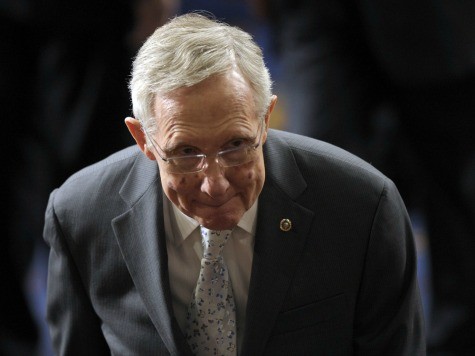
Senate Majority Leader Harry Reid is trying to scuttle a deal to raise the minimum wage, The Hill reports, despite the fact that the proposed increase matches one proposed by President Obama last year, providing new evidence that Reid and other top Democrats are more interested in giving themselves a political cudgel than a policy victory.
Sen. Susan Collins (R-ME) is trying to broker a deal to lift the minimum wage to $9 an hour, a compromise from the Democrats’ current push for a hike to $10.10 an hour. Reid (D-NV) is struggling to keep his Democrat colleagues from backing the Collins deal, The Hill reports.
National Democrats are increasingly concerned about a turnout disadvantage this fall. Historically, voters in midterms tend to be older, which favor Republicans. This natural GOP advantage is magnified by Obama’s lagging unpopularity, especially among younger voters who are critical blocks of the Democrat base. If large segments of the Democrat base stay home in November, a difficult election cycle could become a disaster for Democrats.
In recent months, Democrats have embraced a minimum wage increase as an issue to motivate their base voters. State legislatures controlled by Democrats have pushed their own wage hikes and labor activists have placed ballot initiatives to raise the minimum wage in two battleground states, Arkansas and Alaska. Democrats used a similar strategy in 2006, when they swept to majorities in both chambers of Congress.
As a political issue, however, it would be far more difficult to exploit if Republicans helped broker a deal that passed the Senate.
Collins’ proposal to increase the federal minimum wage to $9 an hour is the same level proposed by President Obama last year. Obama’s proposal would have indexed the wage to inflation, while Collins’ plan does not. Still, it would be difficult for Democrats to unite against a rate that was first proposed by the head of their party.
Notably, however, Democrats did not address the issue when they held the presidency, the House, and a supermajority in the Senate, which is odd given their current claims that the issue holds great moral urgency.
A recent report by the Congressional Budget Office offers support for Collins’ position. The non-partisan agency said that an increase to $10.10, proposed by Senate Democrats, would cost 500,000 jobs. An increase to $9, however, would only cost the economy around 100,000 jobs. With a continuing weak jobs market, the CBO report could add momentum to Collins’ push.
An increase to $9 would probably gain enough GOP support to pass the Senate, moving the issue to the House. Speaker John Boehner has recently expressed opposition to raising the minimum wage, citing well-established economic arguments that the policy could hurt young workers and increase unemployment, making it unlikely, though not inconceivable, that the House would follow suit.
In the meantime, Reid’s work to scuttle Collins’ compromise seems to be a cynical admission that, for Democrats, the issue is meant to help Democrat politicians more than low-income workers.

COMMENTS
Please let us know if you're having issues with commenting.